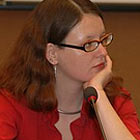Alternative peace plan should be put to the people
Prominent European politicians who came out recently in favour of an alternative peace plan should push the EU to support Israelis and Palestinians embracing other avenues to peace.
The stalling of the Middle Eastern roadmap and the upcoming presidential elections in the United States have left the EU and other parties to the Middle East peace process – the UN, Russia and Arab countries – frustrated and willing to explore other options. One increasingly popular alternative is the unofficial ‘Geneva initiative', a complete final accord negotiated by private Israeli and Palestinian citizens.
As leaders of this group, Yossi Beilin and Yasser Abed Rabbo – members of former Israeli and Palestinian cabinets – went on a European tour recently to promote the informal plan. Their visit elicited positive reactions from top European politicians, including EU foreign policy chief Javier Solana, External Relations Commissioner Chris Patten and UK and Danish Foreign Ministers Jack Straw and Per-Stig Moeller.
“I think the Geneva initiative is perfectly compatible with the roadmap and, in fact, I think it may help not only to implement it but to resolve its last phases,” Solana said after meeting the veteran politicians.
In a 13 February resolution, the German parliament (Bundestag) welcomed the Geneva initiative, which represents “a compromise line” and “completes” the roadmap by giving it a “concrete perspective”. Joschka Fischer, the German foreign minister, had previously greeted it as “an encouraging signal of hope”. In contrast to other plans on the table and the defunct ‘Oslo Process', the Geneva initiative takes as its starting point a final status agreement. By tackling the sticking points of Jerusalem and the exact borders of a future Palestinian state, the plan's authors hope to overcome grassroots scepticism.
The positive momentum the plan is creating, with 58 former global leaders and eight US officials signing a letter of support, is a good start. But much more is needed to prevent this umpteenth high-level effort from becoming yet another dead letter. To that end, Patten indicated his willingness to put some EU money behind the project. The commissioner touched upon the crux of the initiative's success – citizen involvement. In a region sceptical of every new plan and disgruntled with its leadership, getting people directly involved might instigate a major breakthrough.
Recognising this, the text of the Geneva initiative was sent to every Israeli household and was made available in the Palestinian media. Additionally, Ami Ayalon, a former Israeli security chief, and Sari Nusseibeh, a senior Palestinian academic, kicked off the People's Voice project, which aims to mobilise mass public support for a similar final status agreement. They have so far gathered some 100,000 Israeli and 60,000 Palestinian signatures. Joint Israeli-Palestinian popular action has traditionally been limited to such non-political gestures as expeditions to Antarctica and communal peace villages.
These new initiatives finally deem Israelis and Palestinians to be sufficiently mature politically to have a say in the shape of a future peace. The next step would be to launch a broad public debate in which the various proposals could be discussed and refined before being put to a referendum. The parties to the Geneva initiative believe that the leadership should “put the plan directly to their respective peoples”. The international community should mount “a concerted political campaign, calling on Israelis and Palestinians to vote in favour of the plan,” as Rob Malley of the International Crisis Group, the Brussels-based think-tank behind the unofficial accords, put it in a recent article.
While people on both sides long for peace – 82.8% support the cessation of violence – an overwhelming 83.7% believe the peace process is dead, but roughly 40% support the Geneva initiative. However, the vast majority of those involved – Israelis, Palestinians and third parties alike – anticipate that the terms of any final settlement cannot differ much from what has already been negotiated. What appears to be missing for a breakthrough is mutual trust, political courage and respect for public opinion.
_______
This article first appeared in the 19-25 February 2004 edition of The European Voice.



